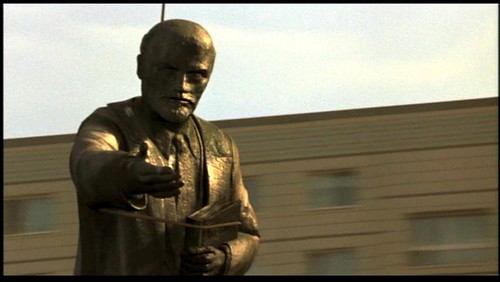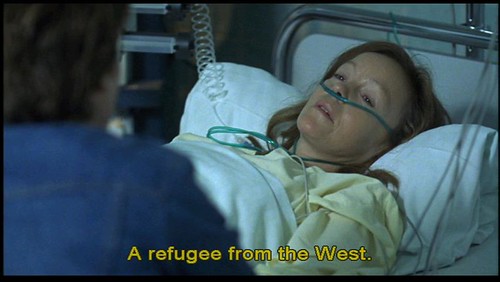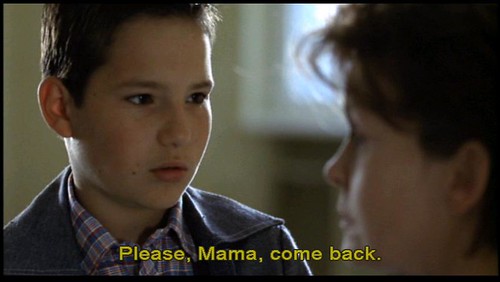Goodbye Lenin * * * *
 Goodbye Lenin is a nostalgic tribute of a son, Alex, to his mother, a mother who was a idealist member of the East German communist party during the 1980s. Least 'member of the communist party' makes you think of grey suits in smokey rooms with severe expessions on their faces, the emphasis here is on idealistic. She worked energetically with the Young Pioneers and with those who were at a disadvantage in society, as a choir director, and worked tirelessly in her community. For me though, this movie wasn't really about East German socialism or the fall of communism. It was about the love of Alex for his mother. The movie is about his nostalgia for his mother, using the comic story of the final 8 months of her life as the vehicle. For him the trappings of life in the socialist East Germany -- the spartan furniture, the blue scarfs of the Young Pioneers, the May Day parades, the cheesy, propaganda laden, East German news reports, all that -- remind him fondly of his mother even if he has no particularly fond feelings for life under communist rule.
Goodbye Lenin is a nostalgic tribute of a son, Alex, to his mother, a mother who was a idealist member of the East German communist party during the 1980s. Least 'member of the communist party' makes you think of grey suits in smokey rooms with severe expessions on their faces, the emphasis here is on idealistic. She worked energetically with the Young Pioneers and with those who were at a disadvantage in society, as a choir director, and worked tirelessly in her community. For me though, this movie wasn't really about East German socialism or the fall of communism. It was about the love of Alex for his mother. The movie is about his nostalgia for his mother, using the comic story of the final 8 months of her life as the vehicle. For him the trappings of life in the socialist East Germany -- the spartan furniture, the blue scarfs of the Young Pioneers, the May Day parades, the cheesy, propaganda laden, East German news reports, all that -- remind him fondly of his mother even if he has no particularly fond feelings for life under communist rule. Rather than getting caught up into sentamentality, the movie is a comedy of sorts. Or I should say it's comic. It's not really a comedy. I started crying about 5 minutes into the movie. It's not that it's sad exactly; it's that Alex loves his mother so much and really you'd have to be hard-hearted not to tear up in the scenes when he is sitting at her hospital bed. His mother has had a heart-attack and she must be protected from excitement. She happened to lay in a coma during the entire fall of communism in East Germany and the dismantling of the Berlin wall. He decides that she couldn't take knowing that the ideal of socialism, to which she was so devoted, had been defeated by capitalism. So he comes up with a scheme of creating a little East German world (the bedroom in which she is bed-ridden) for her. As you might imagine, this becomes rather difficult and he faces all sorts of comic challenges -- uh oh, how to explain the Coke-a-cola banner that is unfurled on a building visible outside her window!
Rather than getting caught up into sentamentality, the movie is a comedy of sorts. Or I should say it's comic. It's not really a comedy. I started crying about 5 minutes into the movie. It's not that it's sad exactly; it's that Alex loves his mother so much and really you'd have to be hard-hearted not to tear up in the scenes when he is sitting at her hospital bed. His mother has had a heart-attack and she must be protected from excitement. She happened to lay in a coma during the entire fall of communism in East Germany and the dismantling of the Berlin wall. He decides that she couldn't take knowing that the ideal of socialism, to which she was so devoted, had been defeated by capitalism. So he comes up with a scheme of creating a little East German world (the bedroom in which she is bed-ridden) for her. As you might imagine, this becomes rather difficult and he faces all sorts of comic challenges -- uh oh, how to explain the Coke-a-cola banner that is unfurled on a building visible outside her window! Like LoveFilm, which I also recently saw, this movie highlights the cruelty of the Iron Curtain and the effect of escape to the West on those left behind. Alex's father escapes to the West when Alex is about 10 years old and his father never returns (obviously he can't). The early scenes of young Alex hugging and crying on the shoulder of his depressed mother had me working the Kleenex box. The real cruelty of what happened doesn't emerge till much later in the film, when Alex's mother finally talks with her kids about the circumstances surrounding their father's emigration.
Like LoveFilm, which I also recently saw, this movie highlights the cruelty of the Iron Curtain and the effect of escape to the West on those left behind. Alex's father escapes to the West when Alex is about 10 years old and his father never returns (obviously he can't). The early scenes of young Alex hugging and crying on the shoulder of his depressed mother had me working the Kleenex box. The real cruelty of what happened doesn't emerge till much later in the film, when Alex's mother finally talks with her kids about the circumstances surrounding their father's emigration.In summary, this is a wonderful film about love, family, and the fall of communism.
Labels: East-Germany, Germany

<< Home